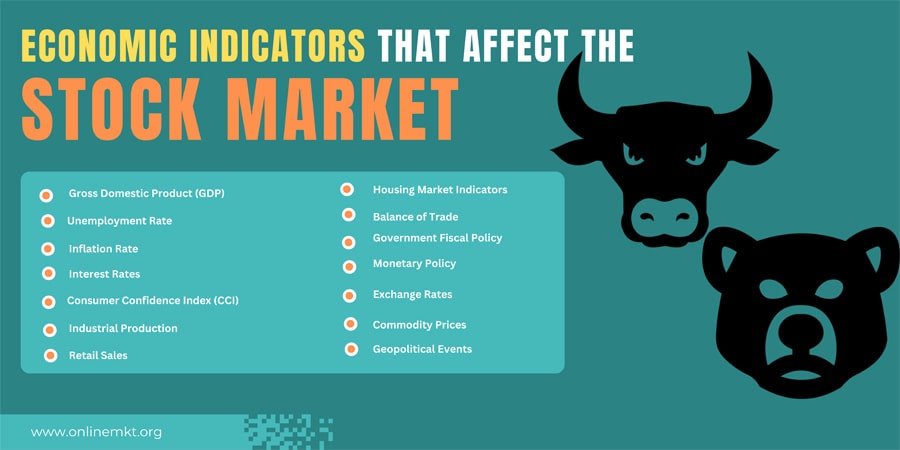Economic Indicators that Affect the Stock Market

The stock market seems like a mystery, but did you know a few key indicators can predict its ups and downs?
The stock market is a dynamic entity that constantly reflects the situation of the economy. Like a sensitive barometer, stock prices rise and fall with key economic indicators, providing investors with vital clues about the overall health of the economy.
Rational investors understand that monitoring these economic indicators is essential for navigating the direction of stock market. GDP growth, employment figures, inflation rates, and consumer spending patterns all exert a powerful influence on corporate earnings and investor sentiment.
A healthy economy, marked by expanding GDP, low unemployment, and steady consumer demand, typically translates into a thriving stock market. Conversely, economic headwinds like rising interest rates, surging inflation, and weakening consumer confidence can reduce stock performance. By staying attuned to these economic indicators, investors can better anticipate market shifts and position their portfolios for long-term success.
Do not be a passive investor! Master these economic indicators to make rational investing decisions.
Gross Domestic Product (GDP)
It measures the total value of goods and services produced over a specific time period. A growing GDP indicates a healthy economy, which generally boosts investor confidence and stock prices. Conversely, a shrinking GDP can lead to a decline in stock prices.
Unemployment Rate
The percentage of the labor force that is unemployed and actively seeking employment. High unemployment rates can signal economic trouble and negatively affect stock prices, while low unemployment rates often indicate a strong economy, which can boost stock prices.
Inflation Rate
It measures the rate at which the general level of prices for goods and services is rising. Moderate inflation is generally considered a sign of a growing economy, but high inflation can reduce purchasing power and hurt corporate profits, leading to lower stock prices. Low inflation can indicate weak demand and economic stagnation.
Interest Rates
The cost of borrowing money is usually set by a country’s central bank. Lower interest rates make borrowing cheaper, which can stimulate investment and consumer spending, leading to higher stock prices. Higher interest rates can have the opposite effect.
Consumer Confidence Index (CCI)
It measures the degree of optimism that consumers feel about the overall state of the economy and their personal financial situation. High consumer confidence usually translates into higher consumer spending, which can drive economic growth and boost stock prices. Low consumer confidence can lead to reduced spending and lower stock prices.
Industrial Production
It measures the output of the industrial sector, including manufacturing, mining, and utilities. An increase in industrial production typically indicates economic growth, which can boost stock prices. A decline can signal economic trouble.
Retail Sales
It measures the total receipts of retail stores. Strong retail sales indicate robust consumer spending, which is a key driver of economic growth and can positively impact stock prices. Weak retail sales can have the opposite effect.
Housing Market Indicators
It includes metrics like housing starts, building permits, and home sales. A strong housing market indicates economic growth and can boost related stocks (e.g., construction, and home improvement). A weak housing market can signal economic troubles.
Balance of Trade
The difference between a country’s exports and imports. A trade surplus (more exports than imports) is generally positive for the economy and stock market, while a trade deficit can be negative.
Government Fiscal Policy
It represents government spending, revenue through tax policies, and borrowing. Expansionary fiscal policy (increased spending or tax cuts) can stimulate the economy and boost stock prices. Contractionary policy (reduced spending or tax increases) can have the opposite effect.
Monetary Policy
It represents the actions of a central bank to control the money supply and interest rates. Expansionary monetary policy (lowering interest rates, quantitative easing) can stimulate the economy and boost stock prices. Contractionary policy (raising interest rates) can reduce economic activity and negatively affect stock prices.
Exchange Rates
The value of a country’s currency compared to others. A strong domestic currency can hurt exporters but benefit importers, affecting stock prices of these sectors. A weak currency can have the opposite effect.
Commodity Prices
Prices of essential commodities like oil, gold, and agricultural products. Rising commodity prices can increase costs for businesses and reduce profit margins, negatively affecting stock prices. Conversely, falling prices can reduce costs and boost profits.
Geopolitical Events
Political events, such as elections, wars, and trade disputes have huge impact on stock market. Geopolitical stability generally supports investor confidence and stock prices, while instability can lead to market volatility and declines.
Conclusion
Remember, the stock market is not just a numbers game – it is a reflection of the broader economic climate and the collective sentiment of investors. By staying attuned to the pulse of the economy, you can better anticipate market trends and make strategic choices that align with your financial goals.
Ultimately, the stock market is a powerful tool for wealth creation, but it requires a keen understanding of the underlying economic forces at play. By staying informed and adaptable, you can navigate the ups and downs of the market with confidence and position yourself for a brighter financial future.